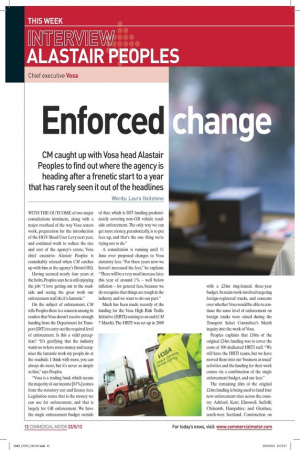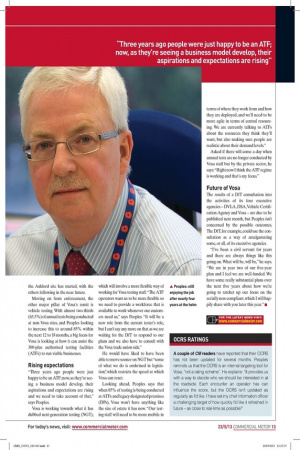Enforced CM caught up with Vosa head Alastair Peoples to
Page 9

Page 10

If you've noticed an error in this article please click here to report it so we can fix it.
find out where the agency is heading after a frenetic start to a year that has rarely seen it out of the headlines Words: Laura Hailstone WITH THE OUTCOME of two major consultations imminent, along with a major overhaul of the way Vosa testers work, preparation for the introduction of the HGV Road User Levy next year, and continual work to reduce the size and cost of the agency's estate, Vosa chief executive Alastair Peoples is remarkably relaxed when CM catches up with him at the agency's Bristol HQ.
Having accrued nearly four years at the helm, Peoples says he is still enjoying the job: "I love getting out to the roadside and seeing the great work our enforcement staff do; it's fantastic."
On the subject of enforcement, CM tells Peoples there is a concern among its readers that Vosa doesn't receive enough funding from the Department for Transport (DfT) to carry out the required level of enforcement. Is this a valid perception? "It's gratifying that the industry wants us to have more money and recognises the fantastic work my people do at the roadside. I think with more, you can always do more; but it's never as simple as that," says Peoples.
"Vosa is a trading fund, which means the majority of our income [83 %] comes from the statutory test and licence fees. Legislation states that is the money we can use for enforcement, and that is largely for GB enforcement. We have the single enforcement budget outside of that, which is DfT funding predominately covering non-GB vehicle roadside enforcement. The only way we can get more money, paradoxically, is to put fees up, and that's the one thing we're trying not to do."
A consultation is running until 11 June over proposed changes to Vosa statutory fees. "For three years now we haven't increased the fees," he explains. "There will be a very small increase later this year of around 1% — well below inflation — for general fees, because we do recognise that things are tough in the industry and we want to do our part."
Much has been made recently of the funding for the Vosa High Risk Traffic Initiative (HRTI) coming to an end (CM 7 March). The HRTI was set up in 2009 with a £24m ring-fenced, three-year budget. Its main work involved targeting foreign-registered trucks, and concerns over whether Vosa would be able to continue the same level of enforcement on foreign trucks were raised during the Transport Select Committee's March inquiry into the work of Vosa.
Peoples explains that £18m of the original £24m funding was to cover the costs of 100 dedicated HRTI staff. "We still have the HRTI teams, but we have moved them into our 'business as usual' activities and the funding for their work comes via a combination of the single enforcement budget, and our fees."
The remaining .f6m of the original £24m funding is being used to fund four new enforcement sites across the country: Ashford, Kent; Elmswell, Suffolk; Chilcomb, Hampshire; and Glenluce, south-west Scotland. Construction on the Ashford site has started, with the others following in the near future.
Moving on from enforcement, the other major pillar of Vosa's remit is vehicle testing. With almost two-thirds (63.5%) of annual tests being conducted at non-Vosa sites, and Peoples looking to increase this to around 85% within the next 12 to 18 months, a big focus for Vosa is looking at how it can assist the 300-plus authorised testing facilities (ATFs) to run viable businesses.
Rising expectations "Three years ago people were just happy to be an ATF; now, as they're seeing a business model develop, their aspirations and expectations are rising and we need to take account of that," says Peoples.
Vosa is working towards what it has dubbed next-generation testing (NGT), which will involve a more flexible way of working for Vosa testing staff. "The ATF operators want us to be more flexible so we need to provide a workforce that is available to work whenever our customers need us," says Peoples. "It will be a new role from the current tester's role, but I can't say any more on that as we are waiting for the DfT to respond to our plans and we also have to consult with the Vosa trade union side."
He would have liked to have been able to move sooner on NGT but "some of what we do is enshrined in legislation': which restricts the speed at which Vosa can react.
Looking ahead, Peoples says that when 85% of testing is being conducted at ATFs and legacy designated premises (DPs), Vosa won't have anything like the size of estate it has now. "Our testing staff will need to be more mobile in terms of where they work from and how they are deployed, and we'll need to be more agile in terms of central resourcing. We are currently talking to ATFs about the resources they think they'll want, but also making sure people are realistic about their demand levels." Asked if there will come a day when annual tests are no longer conducted by Vosa staff but by the private sector, he says: "Right now I think the ATF regime is working and that's my focus."
Future of Vosa The results of a DfT consultation into the activities of its four executive agencies — DVLA, DSA, Vehicle Certification Agency and Vosa — are due to be published next month, but Peoples isn't concerned by the possible outcomes. The DfT, for example, could use the consultation as a way of amalgamating some, or all, of its executive agencies.
"I've been a civil servant for years and there are always things like this going on. What will be, will be," he says. "We are in year two of our five-year plan and I feel we are well-funded. We have some really substantial plans over the next five years about how we're going to ratchet up our focus on the serially non-compliant, which Twill happily share with you later this year." • OCRS RATINGS A couple of CM readers have reported that their OCRS has not been updated for several months. Peoples reminds us that the OCRS is an internal targeting tool for Vosa, "not a rating scheme". He explains: "It provides us with a way to decide who we should be interested in at the roadside. Each encounter an operator has can influence the score, but the OCRS isn't updated as regularly as I'd like. I have set my chief information officer a challenging target of how quickly I'd like it refreshed in future — as close to real-time as possible!"









































